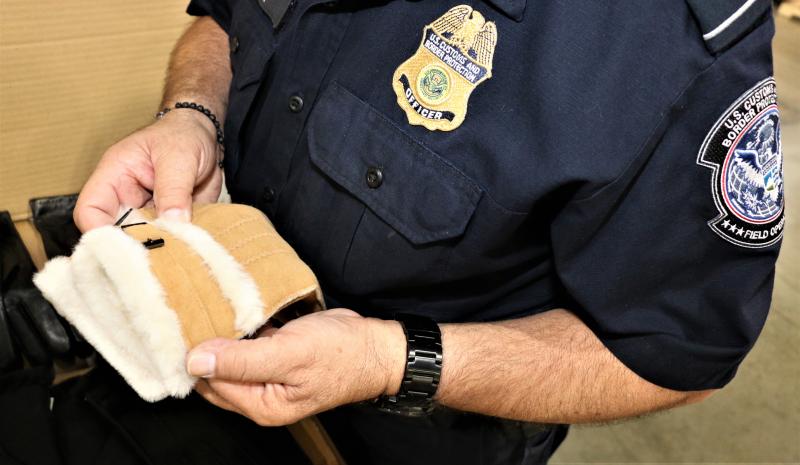 LOS ANGELES — U.S. Customs and Border Protection (CBP) personnel at the Los Angeles/Long Beach Seaport detained a shipment containing 32 cartons of women’s leather gloves suspected to have been manufactured using forced labor. The shipment originated in China’s Xinjiang Uyghur Autonomous Region, where the Chinese government is engaging in systemic human rights abuses against the Uyghur people and other ethnic and religious minorities.
LOS ANGELES — U.S. Customs and Border Protection (CBP) personnel at the Los Angeles/Long Beach Seaport detained a shipment containing 32 cartons of women’s leather gloves suspected to have been manufactured using forced labor. The shipment originated in China’s Xinjiang Uyghur Autonomous Region, where the Chinese government is engaging in systemic human rights abuses against the Uyghur people and other ethnic and religious minorities.
CBP detained the shipment in September in accordance with a Withhold Release Order (WRO) on apparel manufactured by Yili Zhuowan Garment Manufacturing Co., Ltd. and Baoding LYSZD Trade and Business Co., Ltd. That WRO was the product of a months-long CBP investigation that identified forced labor indicators at Yili Zhuowan and Baoding manufacturing sites including the restriction of movement, isolation, intimidation and threats, withholding of wages, and abusive working and living conditions.
“The Trump administration is taking decisive action to combat the brutal practice of forced labor and counteract China’s unfair trade practices,” said CBP Acting Commissioner Mark A. Morgan. “Forced labor not only subjects workers to violence and intimidation, but it also hurts U.S. businesses and the economy.”
Federal statute 19 U.S.C. 1307 prohibits the importation of merchandise mined, manufactured, or produced, wholly or in part, by forced labor, including convict labor, forced child labor, and indentured labor. CBP issues WROs to direct personnel at ports of entry to detain shipments of goods reasonably suspected to have been made by forced labor. Importers of record have three months to re-export detained shipments or to submit proof to CBP that the merchandise was not produced with forced labor.
 Imported goods made with forced labor create unfair competition for U.S. companies that respect human rights and fair labor standards. All importers operating in the United States are responsible for ensuring that their supply chains are free of forced labor and that the origin and quality of their merchandise align with the laws and principles established by the U.S. Government.
Imported goods made with forced labor create unfair competition for U.S. companies that respect human rights and fair labor standards. All importers operating in the United States are responsible for ensuring that their supply chains are free of forced labor and that the origin and quality of their merchandise align with the laws and principles established by the U.S. Government.
“CBP will not tolerate modern slavery in U.S. commerce,” said Brenda Smith, Executive Assistant Commissioner of the CBP Office of Trade. “We expect every U.S. importer to ensure that its supply chains are free of forced labor.”
In Fiscal Year 2020, CBP issued an unprecedented 13 WROs, including eight on goods from China. Recent CBP WROs have encouraged entities to address concerns about forced labor in their tobacco, gold>, and seafood supply chains, among others. CBP publishes all WROs to its Forced Labor Withhold Release Orders and Findings web page.
CBP receives allegations of forced labor from a variety of sources, including from the public. Any person or organization that has reason to believe merchandise produced with the use of forced labor is being, or likely to be, imported into the U.S. can report detailed allegations by contacting CBP through the e-Allegations Online Trade Violation Reporting System or by calling 1-800-BE-ALERT.
No comments:
Post a Comment